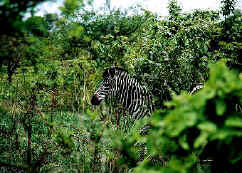 |
|
|
It
took time to develop an "eye" for spotting animals in the bush.
Above, our first zebra spotting.
We would see many animals in the open in the next
few weeks, but would never forget these first glimpses. |
This is Phanuel, our intrepid guide
the first day. Phanuel is a great story-teller, and kept us entertained
in the evenings at the lodge. The Zimbabwean safari guides go through
rigorous training, and were wonderful both because of their knowledge
and their dedication.
|
|
|
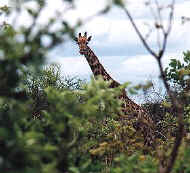 |
|
Even I
could spot the giraffe!
Giraffes are popular grazing companions for other species, like zebra and
impala, because their periscopic neck and sharp eyesight provide
early warning if predators are nearby. |
And our intrepid jeep, like all the
vehicles on these drives, was a Toyota 4-runner. In Zimbabwe open
vehicles are permitted in the game parks (unlike Kenya, for example).
This one took a beating, but I wonder how they would fare in snow and
ice?
|
|
|
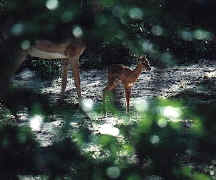 |
|
| There are
lots of baby animals in the rainy season, but they are sometimes harder to
find. Above, a baby impala with mum. |
Keith has spotted something
intriguing to photograph here... an impala or kudu perhaps, hidden in
the bush.
|
|
|
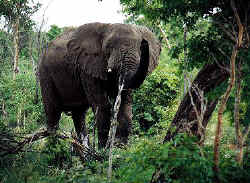 |
The roads through Hwange National
Park varied; sometimes paved, sometimes a dirt road, depending on what
we were looking for. When we spotted wildlife, the guide would shut off
the engine and we would coast as close to the animal as we could get.
Guides were permitted to leave the jeep; tourists were not.
|
| Elephants
have poor eyesight, but a keen sense of smell. This elephant is waving his
trunk in our direction, to catch our scent. Our guides told us that
elephants see a large blurry animal (us in the jeep) which makes an odd
clicking and whirring sound (our cameras). So far these strange creatures
(tourists!) have not proven threatening, though elephants are naturally
more cautious when there are young. |
Hwange has been almost too
successful in its conservation efforts: the park can support 12,000
elephants but at the time of our visit we were told the population had
swelled to over 20,000. We saw the results of this overpopulation:
great tracts of land completely destroyed. Because these gentle giants
are devastated by the death of one family member, the elephant culling
program wipes out entire families of breeding elephants.
|
|
|
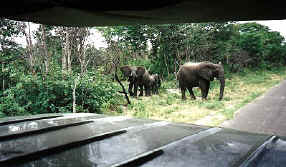 |
|
| Above is a
family with a young elephant to protect. |
Yes, a "zebra
crossing".
|
|
|
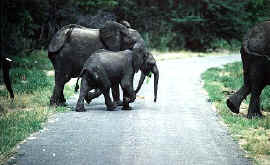 |
|
| The young
elephant continues munching while crossing the road. |
Storks gather in a tree at dusk.
|